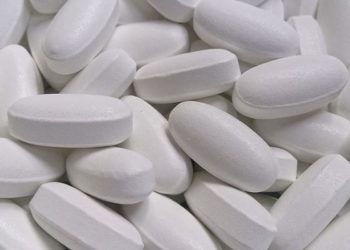Wellness Check: Nutrition
Probiotic Bi-07 is non-inferior to lactase supplementation in patients with lactose intolerance
1. In this randomized controlled trial, the probiotic Bifidobacterium animalis subsp. lactis Bi-07 (Bi-07) was non-inferior to lactase supplementation in treating those with lactose intolerance.
2. Although Bi-07 was associated with better lactose digestion compared to placebo, the odds of nausea were higher in those who received the probiotic.
Evidence Rating Level: 1 (Excellent)
Lactose intolerance is a common condition caused by a decreased expression of lactase enzyme in the small intestine. For patients with lactose intolerance, one potential therapeutic strategy is lactase supplementation. Certain bacteria can also metabolize lactose, however, the effects of these probiotics on lactose digestion require further elucidation. Therefore, the goal of the present study was to determine the effects of the probiotic Bifidobacterium animalis subsp. lactis Bi-07 (Bi-07) on lactose maldigestion.
The study reported 2 randomized cross-over clinical trials that investigated the effects of Bi-07 on lactose digestion. The Booster Alpha study was performed in Germany while the Booster Omega study was in France. Patients were included if they were between the ages of 25 and 60 years, had self-declared or medically diagnosed lactose intolerance, and had a positive lactose challenge result in pre-screening, as defined by an increase of >20 parts per million in a Breath Hydrogen Concentration (BHC) test. Patients with gastrointestinal disorders, diabetes, or prior abdominal surgery were excluded. 68 individuals (34 in each study) were randomized to 6 possible sequences of 3 treatments: (1) Bi-07 (2.40×1012 CFU in Booster Alpha, 2.34×1012 in Booster Omega), (2) 4662 FCC unit lactase, and (3) 6g maltodextrin (placebo). The primary outcome was the difference in BHC (ppm) among the different groups, and secondary outcomes included experiences of gastrointestinal symptoms as determined by patient questionnaires.
The results demonstrated both Bi-07 and lactase to be superior to placebo in modulating BHC levels in the Booster Alpha trial. In the Booster Omega trial, Bi-07 was superior to placebo and non-inferior to lactase. There were no significant differences in rates of gastrointestinal symptoms between Bi-07 and placebo in Booster Alpha, but there was an increased incidence of nausea during Bi-07 treatment in the Booster Omega study. One limitation of this study was the use of an unvalidated gastrointestinal symptom questionnaire which may not have accurately portrayed the effects of the various treatments on gastrointestinal symptoms. Nonetheless, the study results suggested that Bi-07 may be an effective therapeutic strategy for lactose maldigestion.
Amount of unprocessed red meat consumption does not modulate weight loss maintenance
1. In this randomized controlled trial, there was no difference in weight, body mass index (BMI), or body fat content between subjects who consumed moderate versus high levels of lean beef during the first 3 months of weight loss maintenance.
2. Furthermore, in both high- and moderate-protein intake groups, cardiometabolic risk factors, such as cholesterol content and blood pressure, were improved during the weight maintenance phase compared to pre-weight loss values.
Evidence Rating Level: 1 (Excellent)
Maintaining weight loss is highly challenging and may be further hindered by reductions in metabolically active lean tissue mass and resting energy expenditure (REE) during weight loss. High-protein diets have been known to help reduce lean tissue loss and REE reductions during weight loss. Red meat is particularly high in protein, and although red meat consumption has been associated with increased cardiometabolic risks, most prior studies have not distinguished between processed and unprocessed red meats. Therefore, the aim of the present study was to investigate the effects of unprocessed red meat consumption on weight loss maintenance and cardiometabolic risk.
This randomized controlled trial conducted in Denmark included 80 adults between the ages of 18 and 65 years who were overweight (BMI 28-40 kg/m2) and who underwent an 8-week rapid weight loss program. Patients were excluded if they experienced a bodyweight change of >5% within three months of the study, were vegetarian, vegan, or pregnant, or had a history of diabetes, eating disorders, cancer, or heart, liver, or kidney disease. Patients were randomized to either a weight maintenance diet with moderate-protein intake of 25g beef/day (n=45) or a high-protein diet with 150g beef/day (n=35) for 12 weeks. Primary outcomes were mean body weight, fat mass, and body fat content after the 12-week weight maintenance phase. Secondary outcomes included cardiometabolic risk factors, including resting blood pressure, blood glucose level, and cholesterol content.
The results demonstrated that both moderate- and high-protein diets resulted in similar decreases in mean body weight, mean fat mass, and mean body fat content during the weight maintenance phase. Mean lean mass and mean REE increased similarly between the two groups. Additionally, cardiometabolic risk factors showed an overall improvement throughout the study and were similar between the moderate- and high-protein groups. However, the study was limited by the relatively short weight maintenance phase which may not accurately reflect the timeline of weight regain following weight loss. Nonetheless, the study demonstrated that high unprocessed red meat consumption may aid in weight loss maintenance without significantly affecting cardiometabolic risk.
Consumption of micro-RNA-375-3p in breast milk may reduce risk of atopic disease
1. In this longitudinal cohort study, infants who did not develop atopic disease consumed breast milk containing higher concentrations of the micro-RNAs (miRNAs) miR-375-3p and miR-148-3p compared to those who developed atopic disease.
2. Additionally, the concentration of miR-375-3p in breast milk increased throughout the lactation period and was inversely proportional to maternal body mass index (BMI).
Evidence Rating Level: 2 (Good)
Food allergies, asthma, and atopic dermatitis are common childhood atopic diseases that arise from inappropriate immune activation to non-noxious stimuli. Previously, it has been shown that infants who are breastfed beyond 3 months of age have a lower risk of developing atopic conditions. Although, the mechanisms behind this risk reduction are unclear, it has been suggested that micro-RNAs (miRNA) in breast milk may play a role. Therefore, the aim of the present longitudinal cohort study was to investigate whether certain miRNAs present in human breast milk may be linked with reduced risk of atopic conditions.
This cohort study examined 163 mother-infant dyads from birth to 12 months of age. Infants who were born at term and breastfed beyond 4 months were included. Dyads were excluded if there were plans for adoption, they were non-English speaking, or if either the mother or infant had co-morbid medical conditions that would prevent breast-feeding. The concentrations of 4 human miRNAs (miR-146b-5p, miR-148b-3p, miR-21-5p, and miR-375-3p) and the number of feeds were measured in the first 6 months to determine miRNA consumption. The primary outcome was presence of atopic disease in the first year of life, as reported by parent questionnaires.
The results found that 73 infants developed atopic disease. It was found that infants who did not develop atopy consumed higher concentrations of miR-375-3p and miR-148-3p. Furthermore, regression analyses showed that the consumption of miR-375-3p was associated with reduced risk of developing atopy. The concentration of miR-375-3p in breast milk increased over the course of lactation and was inversely associated with maternal body mass index (BMI). However, the study was limited by the high dropout rate (24%), which may have impacted the findings. Nonetheless, these results demonstrated the potential role of miRNAs in reducing infant risk of atopic disease.
Image: PD
©2023 2 Minute Medicine, Inc. All rights reserved. No works may be reproduced without expressed written consent from 2 Minute Medicine, Inc. Inquire about licensing here. No article should be construed as medical advice and is not intended as such by the authors or by 2 Minute Medicine, Inc.







